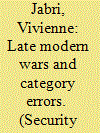|
|
|
Sort Order |
|
|
|
Items / Page
|
|
|
|
|
|
|
| Srl | Item |
| 1 |
ID:
145968


|
|
|
|
|
| Summary/Abstract |
In July 1967, Hannah Arendt wrote to the editor of the New Yorker, William Shawn, to praise Jonathan Schell’s recently published report on Ben Suc, a village of several thousand people along the Saigon River that the American military had recently encircled, bombed, occupied, searched, evacuated, burned, bulldozed, and bombed again. Most of the surviving villagers had been trucked to a hastily constructed relocation camp. Under a ‘long nylon canopy over the bare earth, without floors or walls’, ringed by barbed wire, ‘each family was assigned a place about ten feet square’ to inhabit, along with their pigs and chickens; a sign under the canopy welcomed them to ‘the reception center for refugees fleeing communism’ (Schell, 1967: 69, 74). ‘Nothing else I read has the same immediacy’, she told Shawn, adding that ‘compared with this nylon-concentration camp’, the French internment camp where she had been imprisoned in 1940 ‘was sheer luxury’.
|
|
|
|
|
|
|
|
|
|
|
|
|
|
|
|
| 2 |
ID:
145970


|
|
|
|
|
| Summary/Abstract |
Patricia Owens’s (2015) Economy of Force is one of the most thought-provoking and engaging interventions in recent discourses on war, conflict and security practices. Its central claim is that liberal interventionism, and in particular operations conducted in places such as Iraq and Afghanistan, might be understood in terms of what Owens understands as the ‘ontology of household rule’. Using ‘counterinsurgency’ as a case study, Owens’s wider aim is to provide a critique of the ‘rise of the social’ or ‘sociolatory’ in political and international theory. So enamoured are discourses in politics and international relations with ‘the social’, she suggests, that it is taken for granted as a category of explanation in the absence of any serious attempt at a historical explanation of the rise of the social and ‘the household’ as its fundamental ontology.
|
|
|
|
|
|
|
|
|
|
|
|
|
|
|
|
| 3 |
ID:
145971


|
|
|
|
|
| Summary/Abstract |
Economy of Force is not about the ‘economics of war’, or not in any straightforward sense. Rather, it retrieves the older, but surprisingly neglected, history and theory of oikonomia, the ancient Greek term for ‘household governance’. The book is a study of oikonomia in the use of military force, but also as underlying distinctly social forms of governance more broadly. There is a very long tradition of thinking about households-as-government and a great deal of scholarship in literary and gender studies on practices and ideologies of domesticity. Oikonomia is the origin of the language of modern ‘economics’, but more importantly and revealingly almost all writing about government in the West. International and much political theory is out of touch with these literatures, which has resulted in blindness to a crucial reality about modern governance forms. The large-scale household administration of life processes plays a remarkably central role in international and imperial relations.
|
|
|
|
|
|
|
|
|
|
|
|
|
|
|
|
| 4 |
ID:
145969


|
|
|
|
|
| Summary/Abstract |
Patricia Owens’s remarkable Economy of Force (2015) traces the counterinsurgency strategies used by the British and US empires from Malaya to Afghanistan. If this were all the book was about, though, it would not be so remarkable. What makes it remarkable is that, more than a history of postwar counterinsurgencies, Economy of Force directs our attention to two deeper relationships that have gone unnoticed in existing scholarship. The first is the relationship between counterinsurgency campaigns and uniquely social modes of thought. Counterinsurgency campaigns deployed social theory both to explain why insurgents rebelled and in their efforts to prevent it.
|
|
|
|
|
|
|
|
|
|
|
|
|
|
|
|
|
|
|
|
|